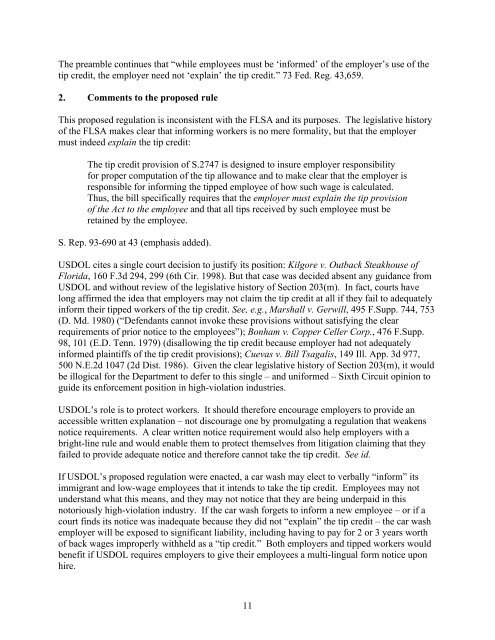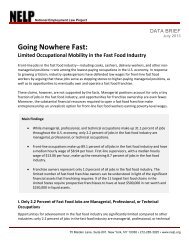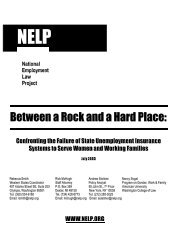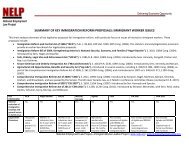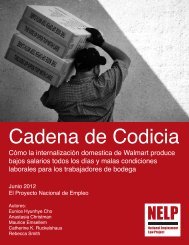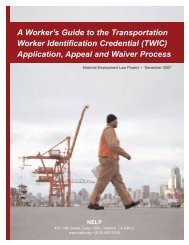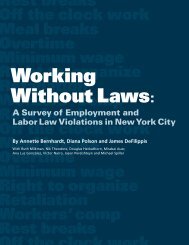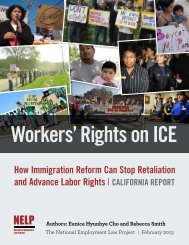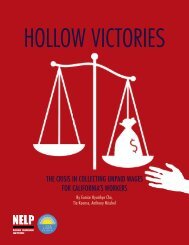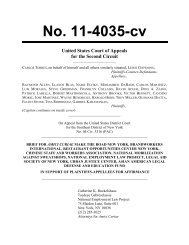National Employment Law Project
National Employment Law Project
National Employment Law Project
You also want an ePaper? Increase the reach of your titles
YUMPU automatically turns print PDFs into web optimized ePapers that Google loves.
The preamble continues that “while employees must be ‘informed’ of the employer’s use of the<br />
tip credit, the employer need not ‘explain’ the tip credit.” 73 Fed. Reg. 43,659.<br />
2. Comments to the proposed rule<br />
This proposed regulation is inconsistent with the FLSA and its purposes. The legislative history<br />
of the FLSA makes clear that informing workers is no mere formality, but that the employer<br />
must indeed explain the tip credit:<br />
The tip credit provision of S.2747 is designed to insure employer responsibility<br />
for proper computation of the tip allowance and to make clear that the employer is<br />
responsible for informing the tipped employee of how such wage is calculated.<br />
Thus, the bill specifically requires that the employer must explain the tip provision<br />
of the Act to the employee and that all tips received by such employee must be<br />
retained by the employee.<br />
S. Rep. 93-690 at 43 (emphasis added).<br />
USDOL cites a single court decision to justify its position: Kilgore v. Outback Steakhouse of<br />
Florida, 160 F.3d 294, 299 (6th Cir. 1998). But that case was decided absent any guidance from<br />
USDOL and without review of the legislative history of Section 203(m). In fact, courts have<br />
long affirmed the idea that employers may not claim the tip credit at all if they fail to adequately<br />
inform their tipped workers of the tip credit. See, e.g., Marshall v. Gerwill, 495 F.Supp. 744, 753<br />
(D. Md. 1980) (“Defendants cannot invoke these provisions without satisfying the clear<br />
requirements of prior notice to the employees”); Bonham v. Copper Celler Corp., 476 F.Supp.<br />
98, 101 (E.D. Tenn. 1979) (disallowing the tip credit because employer had not adequately<br />
informed plaintiffs of the tip credit provisions); Cuevas v. Bill Tsagalis, 149 Ill. App. 3d 977,<br />
500 N.E.2d 1047 (2d Dist. 1986). Given the clear legislative history of Section 203(m), it would<br />
be illogical for the Department to defer to this single – and uniformed – Sixth Circuit opinion to<br />
guide its enforcement position in high-violation industries.<br />
USDOL’s role is to protect workers. It should therefore encourage employers to provide an<br />
accessible written explanation – not discourage one by promulgating a regulation that weakens<br />
notice requirements. A clear written notice requirement would also help employers with a<br />
bright-line rule and would enable them to protect themselves from litigation claiming that they<br />
failed to provide adequate notice and therefore cannot take the tip credit. See id.<br />
If USDOL’s proposed regulation were enacted, a car wash may elect to verbally “inform” its<br />
immigrant and low-wage employees that it intends to take the tip credit. Employees may not<br />
understand what this means, and they may not notice that they are being underpaid in this<br />
notoriously high-violation industry. If the car wash forgets to inform a new employee – or if a<br />
court finds its notice was inadequate because they did not “explain” the tip credit – the car wash<br />
employer will be exposed to significant liability, including having to pay for 2 or 3 years worth<br />
of back wages improperly withheld as a “tip credit.” Both employers and tipped workers would<br />
benefit if USDOL requires employers to give their employees a multi-lingual form notice upon<br />
hire.<br />
11


